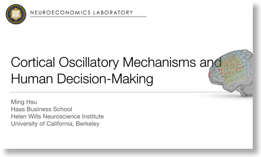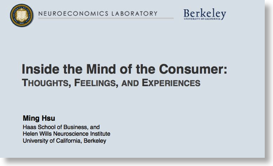Upcoming Talk Schedules at Peking University
Two upcoming talks in Beijing. I had a good chuckle when I saw how utterly different these talks are. There are no shortage of labs that are bigger and more productive than us, but I think we are building something quite special and not easily replicated elsewhere. :-)
 IDG/McGovern Institute for Brain Research
IDG/McGovern Institute for Brain Research
Time: 15Dec. 13:00 - 15:00pm
Location: Room 1113, Wangkezhen Building
 Guanghua School of Business
Guanghua School of Business
Time: 16.Dec. 13:30-15:00pm
Location: Room217, Guanghua Building 2

Time: 15Dec. 13:00 - 15:00pm
Location: Room 1113, Wangkezhen Building
Title
: Oscillatory mechanisms underlying decision-making under uncertaintyAbstract
: Despite tremendous recent progress in elucidating core neurocomputational components that underlie economic decision-making, we still know little about the mechanisms that coordinate the various signals within and across various brain regions. Here I will discuss results from recent electrocorticography (ECoG) studies suggesting a fundamental role of neural oscillations in governing intra- and inter-regional communication during decision-making. Specifically, we recorded local field potentials in the prefrontal cortex of in neurosurgical patients who were engaged in a gambling task. ECoG signals reflect the coordinated activity of ensembles of hundreds of thousands of neurons, and are uniquely poised to reveal fast, circuit-level computations in the human brain. We found that different aspects of the gambling game generated event-related changes in oscillatory activity across multiple areas and frequency bands. Furthermore, oscillatory interactions between lateral and orbital prefrontal regions support cognitive processes underlying decision-making under uncertainty. Together, these data highlight the importance of network dynamics in characterizing neural basis of economic decision-making.
Time: 16.Dec. 13:30-15:00pm
Location: Room217, Guanghua Building 2
Title
: Inside The Mind of the Consumer: Thoughts, Feelings, and ExperiencesAbstract
: Researchers and practitioners have long relied on self-report methods to understand how consumers evaluate, choose, and experience different product offerings. These methods, however, have remained largely unchanged since their introduction decades ago and have a number of well-known limitations. As a result, there is growing interest in brain-based approaches that may enable consumer researchers and managers to directly probe customers’ underlying thoughts, feelings, and experiences. Here I will describe recent progress and open questions in using such methods in understanding customer mindsets.